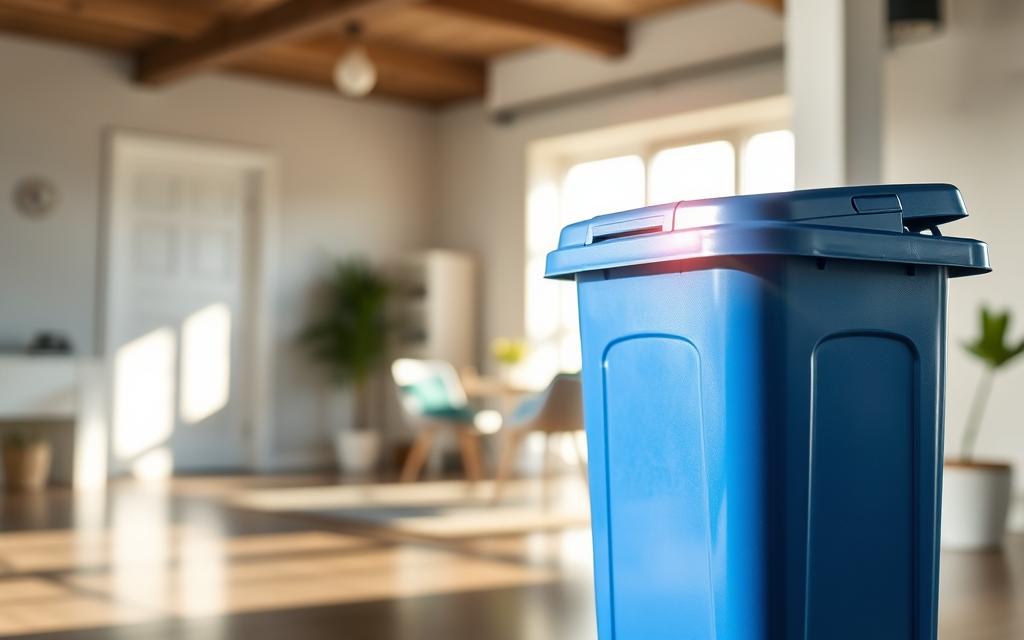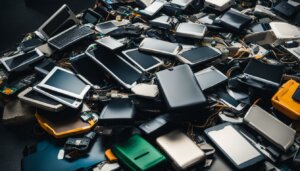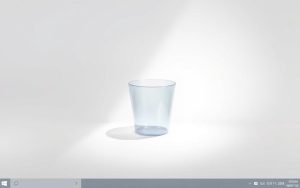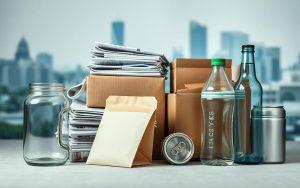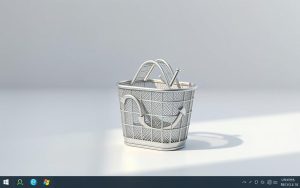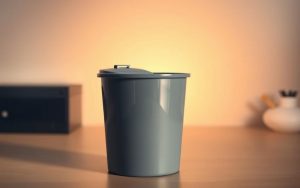Table of Contents
Proper recycling plays a vital role in protecting our environment. By ensuring materials find a second life, we reduce waste and conserve natural resources. However, contamination in recycling streams can undermine these efforts.
This guide simplifies complex rules into actionable steps. It helps you identify which items belong in the recycling bin and which don’t. Making informed choices prevents contamination and supports sustainability.
Every individual has a responsibility to reduce landfill waste. By following best practices, we can collectively make a significant impact. Let’s explore accepted materials, common mistakes, and actionable tips to recycle effectively.
Introduction to Recycling Basics
Understanding the basics of recycling can make a big difference in waste management. Recycling is the process of converting waste into reusable materials. This helps reduce landfill waste and conserve natural resources.
However, contamination can disrupt recycling systems. Food residue, liquids, and non-recyclable items can reduce efficiency. Proper sorting ensures that materials are processed correctly.
Recycling offers both economic and environmental benefits. It saves energy, reduces pollution, and creates jobs. By recycling, we can give items a second life and protect the planet.
Curbside programs and specialty recycling differ in their collection methods. For example, plastic bags are often accepted at retail stores, not curbside. Always check local guidelines, as rules vary by region.
| Type | Curbside Recycling | Specialty Recycling |
|---|---|---|
| Plastic Bags | Not Accepted | Accepted at Retail Stores |
| Glass Bottles | Accepted | Not Applicable |
| Electronics | Not Accepted | Accepted at Drop-Off Centers |
Recycling is a simple yet impactful way to contribute to sustainability. By following best practices, we can ensure that materials are reused effectively. Always verify local rules to avoid contamination and support efficient collection systems.
What Goes in the Recycling Bin
Effective recycling starts with understanding accepted materials. Properly sorting and preparing items ensures they are processed efficiently. This section outlines common recyclable categories and how to prepare them correctly.
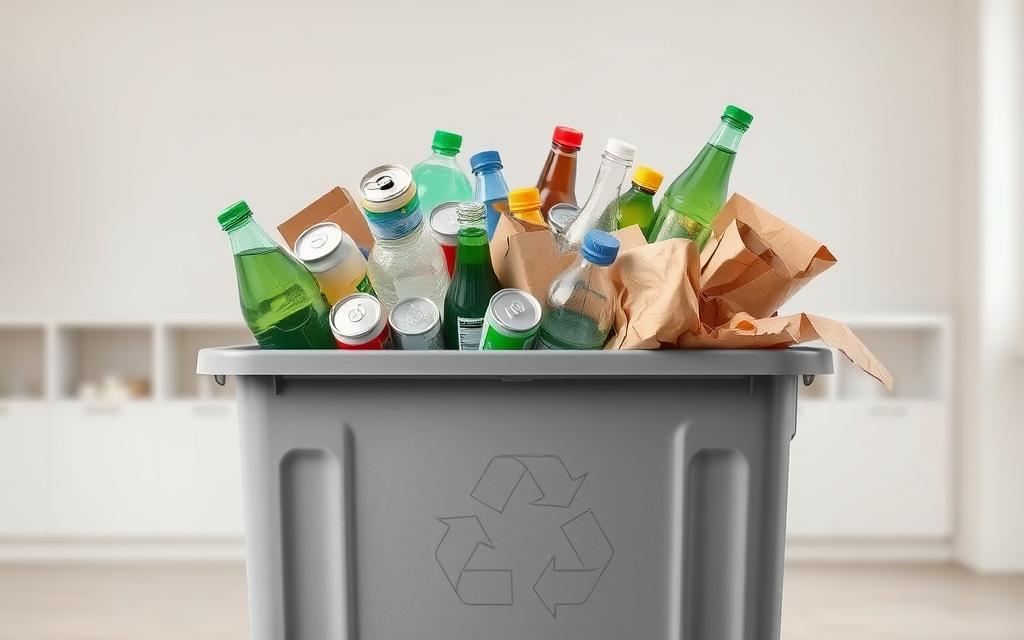
Metal Food & Beverage Cans
Metal cans, such as those for soup, soda, and pet food, are widely accepted. Always rinse them to remove residue. This prevents contamination and ensures they are recyclable.
Plastic Bottles, Jars, Jugs & Tubs
Most plastic containers, including bottles, jars, and tubs, can be recycled. Check for resin codes #1-7, as local rules may vary. Replace caps on bottles to keep them intact during processing.
Glass Bottles & Jars
Only glass bottles jars are accepted. Avoid ceramics or window glass. Ensure there are no broken shards, as they can harm workers and equipment.
Paper & Cardboard
Paper cardboard, including mail, newspapers, and shipping boxes, is recyclable. Flatten boxes to save space and remove tape or labels. This makes processing easier and more efficient.
| Category | Accepted Items | Preparation Tips |
|---|---|---|
| Metal Cans | Soup, soda, pet food cans | Rinse to remove residue |
| Plastic Containers | Bottles, jars, jugs, tubs | Replace caps; check resin codes |
| Glass Bottles & Jars | Beverage and food containers | No broken shards; no ceramics |
| Paper & Cardboard | Mail, newspapers, shipping boxes | Flatten; remove tape/labels |
By following these guidelines, you can ensure your recyclable materials are processed efficiently. Always check local rules for specific requirements.
What Doesn’t Belong in the Recycling Bin
Knowing what to exclude from your recycling efforts is just as important as knowing what to include. Certain materials can disrupt the process, leading to contamination and inefficiency. Let’s explore common items that should never end up in your collection bins.
Plastic Bags and Plastic Wrap
Plastic bags and wraps are among the most problematic items in recycling systems. They often clog sorting machinery, causing delays and damage. Instead of tossing them into curbside bins, return them to grocery store collection points. Many retailers offer dedicated drop-offs for these materials.
Food and Liquid
Leftover food and liquids can contaminate paper and cardboard, making them unrecyclable. Always rinse containers thoroughly before placing them in bins. For food scraps, consider composting as an eco-friendly alternative. This reduces waste and supports sustainable practices.
Clothing and Linens
Clothing and linens don’t belong in recycling bins. Donate wearable items to local charities or thrift stores. For damaged textiles, look for specialty programs that accept them for repurposing. This ensures they are reused rather than ending up in landfills.
Hazardous Items
Hazardous items like batteries, chemicals, and needles require special disposal. These materials can pose serious risks to workers and the environment. Check with local waste management facilities for safe disposal options. Proper handling prevents harm and supports efficient recycling systems.
By keeping these items out of your bins, you help reduce processing costs and landfill waste. Always verify local guidelines to ensure your recycling efforts are effective and sustainable.
Recycling Rules and Best Practices
Adopting the right recycling habits ensures materials are processed efficiently. By following a few simple rules, you can prevent contamination and support sustainability. Let’s explore actionable steps to improve your recycling efforts.
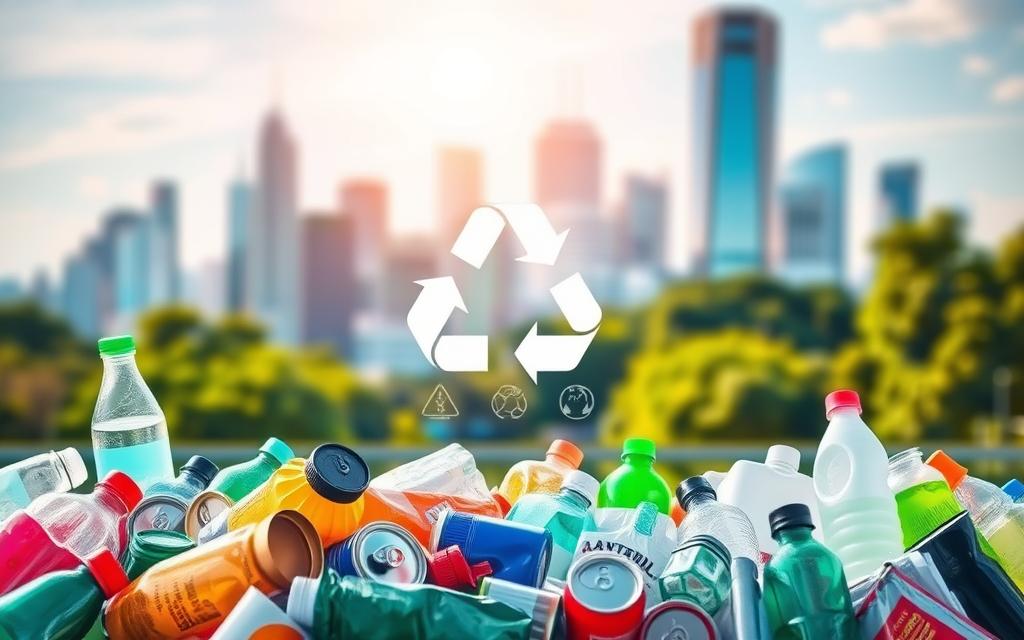
Empty and Rinse All Containers
Residual food or liquids in containers can attract pests and ruin paper recyclables. Always rinse cans, bottles, and jars before placing them in the bin. This small step keeps materials clean and ready for processing.
No Plastic Bags in Curbside Recycling
Plastic bags and wraps are a common source of contamination in curbside programs. They often clog sorting machinery, causing delays and damage. Instead, return them to retail store collection points for proper recycling.
Check Local Recycling Programs
Recycling rules vary widely by location. For example, Massachusetts may accept items that Texas does not. Always verify your local guidelines to ensure compliance. Downloading WM’s “What’s Recyclable” guide can provide quick reference.
| Rule | Action | Benefit |
|---|---|---|
| Empty and Rinse | Clean all containers | Prevents contamination |
| No Plastic Bags | Return to retail stores | Protects machinery |
| Check Local Programs | Verify guidelines | Ensures compliance |
Labeling your bins with free resources from Recycling Resources can also help streamline the process. By following these best practices, you can make a significant impact on reducing waste and improving recycling systems.
“Proper preparation of recyclables is the foundation of an effective recycling system.”
Taking these steps ensures that your recycle efforts are both efficient and sustainable. Always stay informed about local programs to avoid contamination and support waste reduction.
Conclusion
Committing to proper recycling habits ensures a cleaner, sustainable future. By sorting materials correctly and preventing contamination, you support efficient collection systems. Simple actions like rinsing containers and avoiding plastic bags make a big difference.
WM’s services, including curbside pickup and business solutions, make participation easy. Sharing knowledge with your community amplifies the impact of these efforts. Together, we can reduce waste and promote domestic recycling markets.
For ongoing support, explore WM’s downloadable posters and the Recyclopedia tool. These resources help you stay informed and maintain daily habits. Small steps lead to significant changes in protecting our environment.
Learn more about proper disposal guidelines to enhance your recycling efforts. Let’s work together to create a greener tomorrow.
FAQ
Can metal food and beverage cans be recycled?
Yes, metal cans like those for soda, soup, and vegetables are recyclable. Rinse them before placing them in the bin.
Are plastic bottles and containers accepted in curbside recycling?
Most plastic bottles, jars, jugs, and tubs are recyclable. Check local guidelines for specific types.
Can glass bottles and jars go in the recycling bin?
Yes, glass bottles and jars are recyclable. Remove lids and rinse them thoroughly before recycling.
Is paper and cardboard recyclable?
Yes, paper and cardboard are widely accepted. Flatten boxes and remove any food residue or contaminants.
Can plastic bags be recycled curbside?
No, plastic bags and wraps should not go in curbside bins. Take them to designated drop-off locations.
Should food or liquids be placed in the recycling bin?
No, food and liquids can contaminate recyclables. Empty and rinse containers before recycling.
Can clothing and linens be recycled?
Clothing and linens do not belong in the recycling bin. Donate or repurpose them instead.
Are hazardous items like batteries recyclable?
Hazardous items should not go in the bin. Use specialized collection programs for safe disposal.
Why is it important to rinse containers before recycling?
Rinsing removes food residue, preventing contamination and ensuring materials are processed efficiently.
How can I find local recycling guidelines?
Check your municipality’s website or contact waste management services for specific rules and programs.


